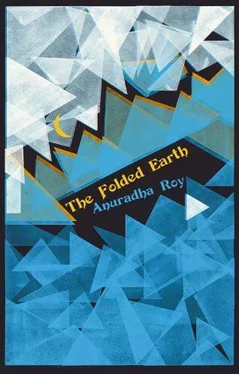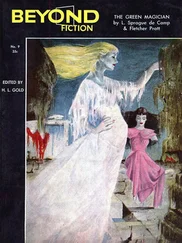The rain had become a constant in our lives, like the damp air and fungus on our walls. It had only to pause to gather breath for Puran to plunge into the deepest forest to root around for guchi mushrooms and tender linguru. This was something he had done every monsoon for as long as he could remember because Diwan Sahib loved eating those wild mushrooms and ferns and nobody else knew where to find them. But Diwan Sahib no longer had any interest in food. He spent his nights sitting up, trying to draw one rattling breath after another — despite which, during the day he smoked and coughed and smoked again. The doctor returned, diagnosed a lung infection and prescribed stronger antibiotics. After two days of the antibiotics, Diwan Sahib began to vomit and his feet swelled like cushions so that he could no longer stand on them.
Mr Qureshi and I conferred, decided there was nothing for it but to put him in hospital. Diwan Sahib vehemently opposed it, and was full of bluster that he thought covered up his fear. “Nobody ever comes out alive from that rotten hospital!” he wheezed. “In fact, nobody I know has ever come out alive from any hospital! Hospitals were made to protect healthy people from ill people. Why don’t you two leave me in peace in my own house?”
“He is just afraid they won’t let him drink and smoke there,” Mr Qureshi said to me as he drove off with Diwan Sahib and Himmat Singh. “Hospital is exactly what our Diwan Sahib needs at this moment.”
When the car was gone I went back to Diwan Sahib’s room and began to tidy up. I picked up the glasses and plates that had collected by his bedside and put them in the kitchen and sorted the medicines heaped on a trunk next to the bed. There were cigarettes hidden away everywhere: under the mattress, tucked behind books and papers. I stripped the bed and remade it so that it was ready when he came back from hospital. I sat down on it with a tired sigh. The house was an echoing shell without Diwan Sahib’s coughs and wheezes and Himmat Singh’s non-stop banging about and cursing in the kitchen. I realised that in all my time in Ranikhet I had never once known the Light House empty — one of the two men was always there, creating the ineffable hum that comes just from someone else’s presence in a house.
It was a long time before I managed to push my unhappy thoughts away and return to tidying up. There was scribbled-on paper everywhere, in bunches, loose sheets, fat files. With a leap of hope, I wondered if any part of the Corbett manuscript had survived the fire. I began to collect the papers and pile them on a table. I was trying to decipher Diwan Sahib’s handwriting on a sheet of paper I had discovered under the bed when I heard a car in the drive again and looked up in a panic. Had they returned already? Had he collapsed on the way to hospital? I did not want to know.
I heard the car door bang. Only once. Then there were footsteps on the wooden floor of the living room, much more rapid than either Diwan Sahib’s shuffling gait or Mr Qureshi’s slow amble. It was Veer, back from his travels.
“I heard on Mall Road,” he said. “Negi told me. I went to the hospital first. He’s better, they say it’s his kidneys, too weak for those antibiotics — but it’s not as bad as it looks. They’ve sent for a serum from Nainital. If it doesn’t come, I’ll go and get it this evening. He’ll be fine.” He looked around the room and at the medicines on the trunk and said, “You poor thing, you’ve had to handle the old man on your own. And it’s been too long this time. Thought the trip would never end. I was starting to forget — ”
He sat down on the bed, gathered me in his arms, and kissed my forehead, then my cheeks, then my lips. He got up and locked the door and came back to me. Blue-green light washed through the curtains. A long way off, we could hear Ama shouting for her rooster, which had wandered off that morning. Veer took my spectacles off and put them on a corner of the trunk next to the bed. He plucked out the long, tasselled wooden pin that held my hair in a knot and shook it loose. One of Charu’s cows mooed on the lawn just outside and its bell tinkled. I had unbuttoned Veer’s shirt, without thinking at all what I was doing. Somewhere I could hear the “ whump-whump ” sound of the madman at the nettles again. But it did not matter, Diwan Sahib could not rush out in the rain after him. Our clothes fell in a heap on the floor, next to Diwan Sahib’s empty bottles, dog-eared books, discarded ballpoint pens, and shrivelled orange pips. The window let in the scent of white roses from the climber that trailed over it. Veer’s hands were everywhere and his tongue was everywhere, we were on the bed, then off it on the wooden floor, and then back on the bed again. I kissed his deformed ear and the four fingers on his left hand, one by one. I closed my eyes. A bird fluttered its wings beneath the stretched curtain of my skin, trying to get out. My throat made sounds I could do nothing to stop. I heard Michael’s voice at my ear, saying, “You wouldn’t wait for me to die to find another man.”
Moments after we had prised ourselves apart, Veer got into his clothes and said, “You should go and get some sleep. You look as if you’ll fall asleep standing.” I left the room, but not the house, unwilling to lose sight of him so soon. I sat in the veranda, half-dozing, half listening to the rustling and thumping sounds that began inside after a while. When I heard something shatter, I jumped up to see what had happened, and found Veer sitting on the floor before Diwan Sahib’s open trunks, looking through them. His face was as impersonal as a stranger’s. “The doctors need his medical papers and I can’t find anything,” he said when he saw me. And then with a frown, “Didn’t you go? I thought you were going down to your own place? I need some time here. I’ll come to your place later.”
I must have looked startled because his expression softened. He got up in a swift uncoiling movement and pulled me to him and kissed me and murmured in my ear. He caressed me wherever he found bare skin. I was resting in his arms, my chin at his neck, soothed by his hands when, in another switch of mood he turned briskly efficient, disentangled himself and gave me a little push. “You’re distracting me,” he said. “Off you go. I have to look for that medical stuff. They have no idea about his history, they need to know the medicines he’s allergic to.”
That night I sat with the jam factory accounts, totting up all we had spent on bottles, labels, fruit, salaries, and what jam had been sold. I should have been light-hearted and happy; Veer was back. If he was preoccupied with Diwan Sahib’s medical papers that was hardly to be wondered at; surely I did not expect him to be a lovesick teenager who had eyes and mind for no-one else. Yet I was in a restless welter of confusion. I could not understand why I felt so disturbed about the changes in his moods that afternoon. I was used to it, not only in him, in his uncle as well. I had resented it sometimes, the burden of being the good-tempered one.
I tried to apply myself to the accounts, but my thoughts kept turning to what my uncle had found in my mother’s room after she died. He had been so perturbed he had written to ask me about it. For much of her later life, even before I left home, my mother had stopped sharing my father’s bed. She seldom allowed anyone else into her own bedroom, cleaning it herself and guarding it as an inviolable refuge, much as I did my own house now. It was only when she fell very ill that other members of the family got access to her room and uncovered all her little secrets: a tin of the chewing tobacco she had claimed to have given up, my letters to her, the album with my baby pictures that my father had wanted to destroy. My uncle said he had found there a thin, curved, lethally sharp steel knife, capable of sliding into flesh as easily as into a ripe mango. Did I know about it? my uncle had written to ask. Had she ever mentioned it to me? Why did she sleep with it under her pillow? The question haunted me still, and I would never know the answer.
Читать дальше












